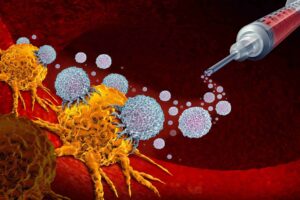Giorgia Guglielmi
Giorgia Guglielmi is a freelance science writer based in Basel, Switzerland. Specializing in life sciences, medicine, and the relationship between science and society, she has published numerous articles in outlets including Nature, Science, and Scientific American. She holds a PhD in biology from the European Molecular Biology Laboratory and a Master’s in Science Writing from the Massachusetts Institute of Technology. She has received recognition for her work, including the John Kendrew Award in 2020 and an ERC-funded FRONTIERS Media Fellowship in 2025. She has also led lectures and workshops on science communication at institutions such as Harvard University and the University of Zurich.
Oncology
Probiotics such as Lactobacillus can complement breast cancer therapy to improve prevention and treatment.
Gastroenterology
High levels of bile acids drive bacterial colonization of the gut and exacerbate gut inflammation by altering the intestinal environment.
Gastroenterology, Scientific research
The effects of coffee on health may be mediated by gut microbes such as L. asaccharolyticus and their metabolites.
Gastroenterology, Gynecology
Mice born to mothers exposed to Akkermansia muciniphila during pregnancy showed improvements in stem cell activity.
Gastroenterology, Neuroscience
A study revealed a link between gut microbiota composition and brain development in preterm infants, suggesting that specific bacteria and their metabolites can influence neurodevelopment.
Gastroenterology, Immunology
The findings of a recent study suggest that while T. musculis can worsen asthma, it might also help the body fight off infections, offering potential for new treatments targeting the…
Dermatology
The skin can independently generate immune responses to control the microbiota and prevent infections, without relying on other immune centers.
Pediatrics, Otolaryngology
The findings suggest that the microbial communities inhabiting an infant’s nose and throat can play a role in the severity of RSV infections.
Scientific research
The findings suggest that bHB could be a therapeutic alternative to a ketogenic diet. The results also highlight the protective role of the gut microbiota and its metabolites in autoimmune…
Oncology
The presence of specific microbes in the gut microbiota can serve as biomarkers for predicting the efficacy of immunotherapy.











